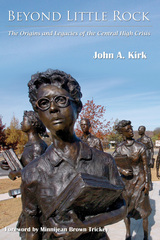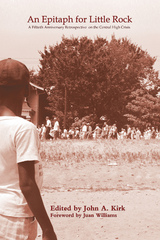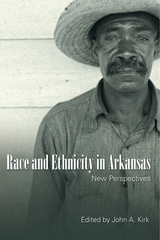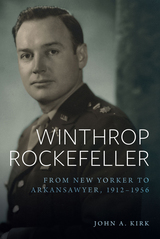5 books about Kirk, John A.

Arsnick
The Student Nonviolent Coordinating Committee in Arkansas
Jennifer Jensen Wallach
University of Arkansas Press, 2011
The Student Nonviolent Coordinating Committee (SNCC) arrived in Arkansas in October 1962 at the request of the Arkansas Council on Human Relations, the state affiliate of the Southern Regional Council. SNCC efforts began with Bill Hansen, a young white Ohioan--already an early veteran of the civil rights movement--who traveled to Little Rock in the early sixties to help stimulate student sit-in movements promoting desegregation. Thanks in large part to SNCC's bold initiatives, most of Little Rock's public and private facilities were desegregated by 1963, and in the years that followed many more SNCC volunteers rushed to the state to set up projects across the Arkansas Delta to help empower local people to take a stand against racial discrimination. In the five short years before it disbanded, the SNCC's Arkansas Project played a pivotal part in transforming the state, yet this fascinating branch of the national organization has barely garnered a footnote in the history of the civil rights movement. This collection serves as a corrective by bringing articles on SNCC's activities in Arkansas together for the first time, by providing powerful firsthand testimonies, and by collecting key historical documents from SNCC's role in the region's emergence from the slough of southern injustice.
[more]

Beyond Little Rock
The Origins and Legacies of the Central High Crisis
John A. Kirk
University of Arkansas Press, 2007
Based on extensive archival work, private paper collections, and oral history, this book includes eight of John Kirk’s essays, two of which have never been published before. Together, these essays locate the dramatic events of the crisis within the larger story of the African American struggle for freedom and equality in Arkansas. Examining key episodes in state history from before the New Deal to the present, Kirk covers a wide range of topics that include the historiography of the school crisis; the impact of the New Deal; early African American politics and mass mobilization; race, gender, and the civil rights movement; the role of white liberals in the struggle; and the intersections of race and city planning policy. Kirk unearths many previously neglected individuals, organizations, and episodes, and provides a thought-provoking analytical framework for understanding them.
[more]

An Epitaph for Little Rock
A Fiftieth Anniversary Retrospective on the Central High Crisis
John A. Kirk
University of Arkansas Press, 2008
This collection of essays mines the Arkansas Historical Quarterly from the 1960s to the present to form a body of work that represents some of the finest scholarship on the crisis, from distinguished southern historians Numan V. Bartley, Neil R. McMillen, Tony A. Freyer, Roy Reed, David L. Chappell, Lorraine Gates Schuyler, John A. Kirk, Azza Salama Layton, and Ben F. Johnson III. A comprehensive array of topics are explored, including the state, regional, national, and international dimensions of the crisis as well as local white and black responses to events, gender issues, politics, and law. Introduced with an informative historiographical essay from John A. Kirk, An Epitaph for Little Rock is essential reading on this defining moment in America's civil rights struggle.
[more]

Race and Ethnicity in Arkansas
New Perspectives
John A. Kirk
University of Arkansas Press, 2014
Race and Ethnicity in Arkansas brings together the work of leading experts to cast a powerful light on the rich and diverse history of Arkansas’s racial and ethic relations. The essays span from slavery to the civil rights era and cover a diverse range of topics including the frontier experience of slavery; the African American experience of emancipation and after; African American migration patterns; the rise of sundown towns; white violence and its continuing legacy; women’s activism and home demon¬stration agents; African American religious figures from the better know Elias Camp (E. C.) Morris to the lesser-known Richard Nathaniel Hogan; the Mexican-American Bracero program; Latina/o and Asian American refugee experiences; and contemporary views of Latina/o immigration in Arkansas. Informing debates about race and ethnicity in Arkansas, the South, and the nation, the book provides both a primer to the history of race and ethnicity in Arkansas and a prospective map for better understanding racial and ethnic relations in the United States.
[more]

Winthrop Rockefeller
From New Yorker to Arkansawyer, 1912-1956
John A. Kirk
University of Arkansas Press, 2022
Why did Winthrop Rockefeller, scion of one of the most powerful families in American history, leave New York for an Arkansas mountaintop in the 1950s? In this richly detailed biography of the former Arkansas governor, John A. Kirk delves into the historical record to fully unravel that mystery for the first time. Kirk pursues clues threaded throughout Rockefeller’s life, tracing his family background, childhood, and education; his rise in the oil industry from roustabout to junior executive; his military service in the Pacific during World War II, including his involvement in the battles of Guam, Leyte, and Okinawa; his postwar work in race relations, health, education, and philanthropy; his marriage to and divorce from Barbara “Bobo” Sears; and the birth of his only child, future Arkansas lieutenant governor Win Paul Rockefeller. This careful examination of Winthrop Rockefeller’s first forty-four years casts a powerful new light on his relationship with his adopted state, where his legacy continues to be felt more than half a century after his governorship.
[more]
READERS
Browse our collection.
PUBLISHERS
See BiblioVault's publisher services.
STUDENT SERVICES
Files for college accessibility offices.
UChicago Accessibility Resources
home | accessibility | search | about | contact us
BiblioVault ® 2001 - 2024
The University of Chicago Press









